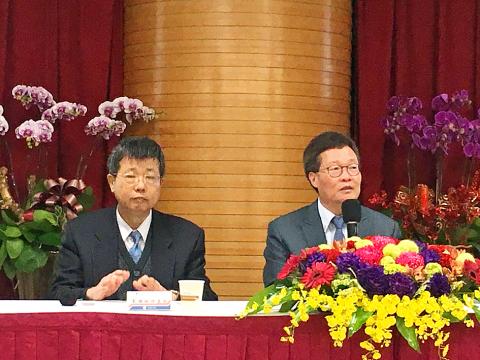CPC Corp, Taiwan (CPC, 台灣中油) yesterday said it plans to allocate more than NT$200 billion (US$6.44 billion) for capital expenditure over the next six years to expand its natural gas business.
“The capital spending would mainly be used for establishing the company’s third liquefied natural gas terminal and constructing natural gas infrastructure in the nation,” CPC chairman Derek Chen (陳金德) told a news conference in Taipei.
The state-run oil refiner plans to spend NT$60.8 billion on a new terminal in Taoyuan for storing natural gas, which is scheduled to start operations before 2023 with an estimated annual capacity of 3 million tonnes.

Photo: Huang Pei-chun, Taipei Times
“The [terminal] plan follows the government’s long-term goal of a nuclear-free homeland, and we expect the terminal to meet demand for natural gas in northern Taiwan,” Chen said.
The plan would require the approval of the Ministry of Economic Affairs and the Executive Yuan, company officials said.
On Thursday last week, Taiwan Power Co (Taipower, 台電), the nation’s main utility, said it was working on a project to build natural gas storage facilities at two coal-fired power plants in Taichung and Keelung, which are expected to be completed by 2025 when the Democratic Progressive Party (DPP) government’s nuclear-free homeland policy is scheduled to take effect.
In an effort to ensure a stable supply of energy, CPC is also planning to improve its infrastructure, including enlarging its natural gas plant in Taichung and building several onshore natural gas pipelines nearby, Chen said.
“The new infrastructure in Taichung is expected to lend support to the Tongxiao natural gas power plant in Miaoli County, which is operated by Taipower,” Chen said.
CPC will also allocate NT$38.4 billion for the renewal of facilities at its Taoyuan refinery to help produce higher=-quality products and reduce air pollution.
However, the renewal plan has been suspended since 2006, as area residents are concerned about potential pollution and want CPC to relocate the refinery, a CPC official said.
The official, who declined to be named, said that the company hopes to obtain the development permit by the end of this year, without giving a detailed timetable.
CPC yesterday also announced land reclamation plans for a new storage center at Kaohsiung Port (高雄港), which would cost nearly NT$53.6 billion.
It said it plans to integrate more than 300 existing storage tanks and pipelines in the new center to improve transportation efficiency.
The storage center is scheduled to start operations before 2024, it said.
The company is also looking for a partner for a joint venture to manufacture styrene and isononyl alcohol, in response to the government’s push for a circular economy, CPC said.

Intel Corp chief executive officer Lip-Bu Tan (陳立武) is expected to meet with Taiwanese suppliers next month in conjunction with the opening of the Computex Taipei trade show, supply chain sources said on Monday. The visit, the first for Tan to Taiwan since assuming his new post last month, would be aimed at enhancing Intel’s ties with suppliers in Taiwan as he attempts to help turn around the struggling US chipmaker, the sources said. Tan is to hold a banquet to celebrate Intel’s 40-year presence in Taiwan before Computex opens on May 20 and invite dozens of Taiwanese suppliers to exchange views

Application-specific integrated circuit designer Faraday Technology Corp (智原) yesterday said that although revenue this quarter would decline 30 percent from last quarter, it retained its full-year forecast of revenue growth of 100 percent. The company attributed the quarterly drop to a slowdown in customers’ production of chips using Faraday’s advanced packaging technology. The company is still confident about its revenue growth this year, given its strong “design-win” — or the projects it won to help customers design their chips, Faraday president Steve Wang (王國雍) told an online earnings conference. “The design-win this year is better than we expected. We believe we will win

Chizuko Kimura has become the first female sushi chef in the world to win a Michelin star, fulfilling a promise she made to her dying husband to continue his legacy. The 54-year-old Japanese chef regained the Michelin star her late husband, Shunei Kimura, won three years ago for their Sushi Shunei restaurant in Paris. For Shunei Kimura, the star was a dream come true. However, the joy was short-lived. He died from cancer just three months later in June 2022. He was 65. The following year, the restaurant in the heart of Montmartre lost its star rating. Chizuko Kimura insisted that the new star is still down

While China’s leaders use their economic and political might to fight US President Donald Trump’s trade war “to the end,” its army of social media soldiers are embarking on a more humorous campaign online. Trump’s tariff blitz has seen Washington and Beijing impose eye-watering duties on imports from the other, fanning a standoff between the economic superpowers that has sparked global recession fears and sent markets into a tailspin. Trump says his policy is a response to years of being “ripped off” by other countries and aims to bring manufacturing to the US, forcing companies to employ US workers. However, China’s online warriors